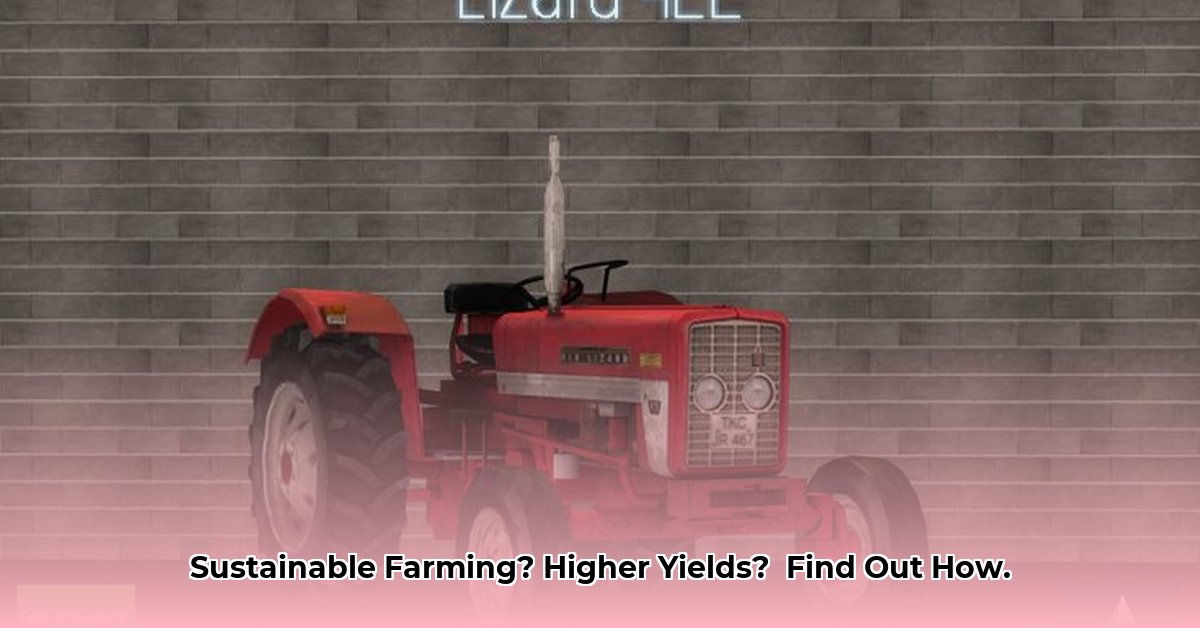
Sustainable farming is no longer a niche concept; it's the cornerstone of a secure food future. Farmers globally face the dual challenge of maximizing crop yields while minimizing environmental impact. This delicate balance can feel impossible, but innovative technologies like the Sims tractor are revolutionizing sustainable agriculture. This article explores how Sims tractors help farmers achieve higher yields with a significantly lighter environmental footprint. For more on tractor benefits, see this page.
A Smarter Approach to Farming: The Sims Tractor in Action
Forget the image of a farmer battling an unwieldy machine. The Sims tractor represents a paradigm shift in agricultural technology. Utilizing GPS technology and an intricate network of sensors, it offers unparalleled precision in every aspect of farming, from planting to fertilization and pest control. This precision is not merely a technological advancement; it's the key to unlocking sustainable farming practices.
Instead of blanket applications of fertilizers and pesticides across entire fields—a wasteful and environmentally damaging practice—the Sims tractor applies these resources precisely where needed. This targeted approach minimizes waste, reduces chemical runoff into waterways, and protects beneficial insects. The result? Higher yields and a healthier environment; a true win-win.
Fuel Efficiency: Environmental Responsibility and Economic Advantage
Sustainability isn't solely about reducing chemical use; it encompasses minimizing a farm's overall carbon footprint. Sims tractors are engineered for exceptional fuel efficiency, leveraging advanced engine technology to maximize output while minimizing fuel consumption. This translates to lower greenhouse gas emissions and substantial savings on fuel costs. A 15-20% reduction in fuel expenditure is not uncommon, freeing up valuable capital for reinvestment in other farm improvements or sustainable technologies.
Data-Driven Decisions: Precision Farming's Analytical Powerhouse
The Sims tractor is more than a machine; it’s a sophisticated data collection and analysis platform. It continuously monitors soil conditions, crop health, and moisture levels, providing farmers with a detailed, real-time assessment of their fields. This data transforms farming from reactive to proactive, enabling informed decisions based on precise, quantified indicators.
The user-friendly software accompanying most Sims tractor models simplifies data interpretation, making it approachable for farmers of all technical backgrounds. Furthermore, comprehensive support is readily available, ensuring a smooth transition and ongoing assistance.
Adaptability: Tailored Solutions for Diverse Farms
Farming is a uniquely diverse field. Sims tractors offer a range of configurations, ensuring compatibility with various farm sizes, crop types, and operational scales. Whether a large-scale operation or a smaller, more complex plot, there exists a Sims tractor tailored to meet specific needs. The Sims team also provides expert guidance, ensuring farmers select the optimal configuration for their operations.
The Financial Equation: A Sustainable Investment
While the initial investment in a Sims tractor is substantial, the long-term return is arguably even greater. The increased yields alone often surpass the initial expense. Combined with savings from reduced fertilizer, pesticide, and fuel consumption, the financial benefits become undeniably compelling.
| Feature | Benefit | Potential Cost Savings (Estimate) |
|---|---|---|
| Precision Application | Reduced fertilizer & pesticide use | 10-25% |
| Fuel Efficiency | Lower operating costs | 15-25% |
| Increased Yields | Higher revenue from greater harvest | Highly Variable |
| Data-Driven Decisions | Improved resource allocation and efficiency | Highly Variable |
Note: These are approximate figures. Actual savings vary based on farm size, crops cultivated, and existing farming practices. Consult a Sims tractor specialist for a personalized cost-benefit analysis.
Challenges and Considerations: A Balanced Perspective
The adoption of any new technology presents a learning curve. Mastering the Sims tractor's operation and data interpretation requires time and training. However, comprehensive training and ongoing support are provided to ensure a seamless transition. Furthermore, the initial investment can pose a challenge; however, various financing options are typically available.
Ultimately, the decision to invest in a Sims tractor requires thorough consideration of budget, farming operations, and long-term goals. The potential for increased sustainability, efficiency, and profitability often makes it a strategically sound investment. The future of farming is indeed here, characterized by smart, efficient, and sustainable practices.
Embracing Precision Farming's Sustainability on Small Farms
Precision agriculture's benefits extend beyond large-scale operations. Small farms can leverage this technology to enhance efficiency and sustainability, although it requires careful planning and resource management. Affordable technology, coupled with governmental support and training initiatives, makes precision agriculture increasingly accessible. Data security and privacy are nonetheless critical considerations.
Three Pivotal Points for Small-Farm Precision Agriculture:
- Targeted Technology Adoption: Start with cost-effective solutions like GPS-guided machinery and soil sensors before investing in more complex systems.
- Data-Driven Decision Making: Utilize readily available data analysis tools to translate raw data into actionable insights and optimize farming practices.
- Collaborative Efforts: Leverage cooperative models and shared equipment to overcome resource constraints and collectively benefit from advanced technologies.
The Sims tractor offers a pathway towards a more sustainable and profitable future for farms of all sizes. By embracing data-driven decision-making and adopting precision farming technologies, farmers can simultaneously increase yields while minimizing their environmental impact. The future of farming is here, and it's sustainable.